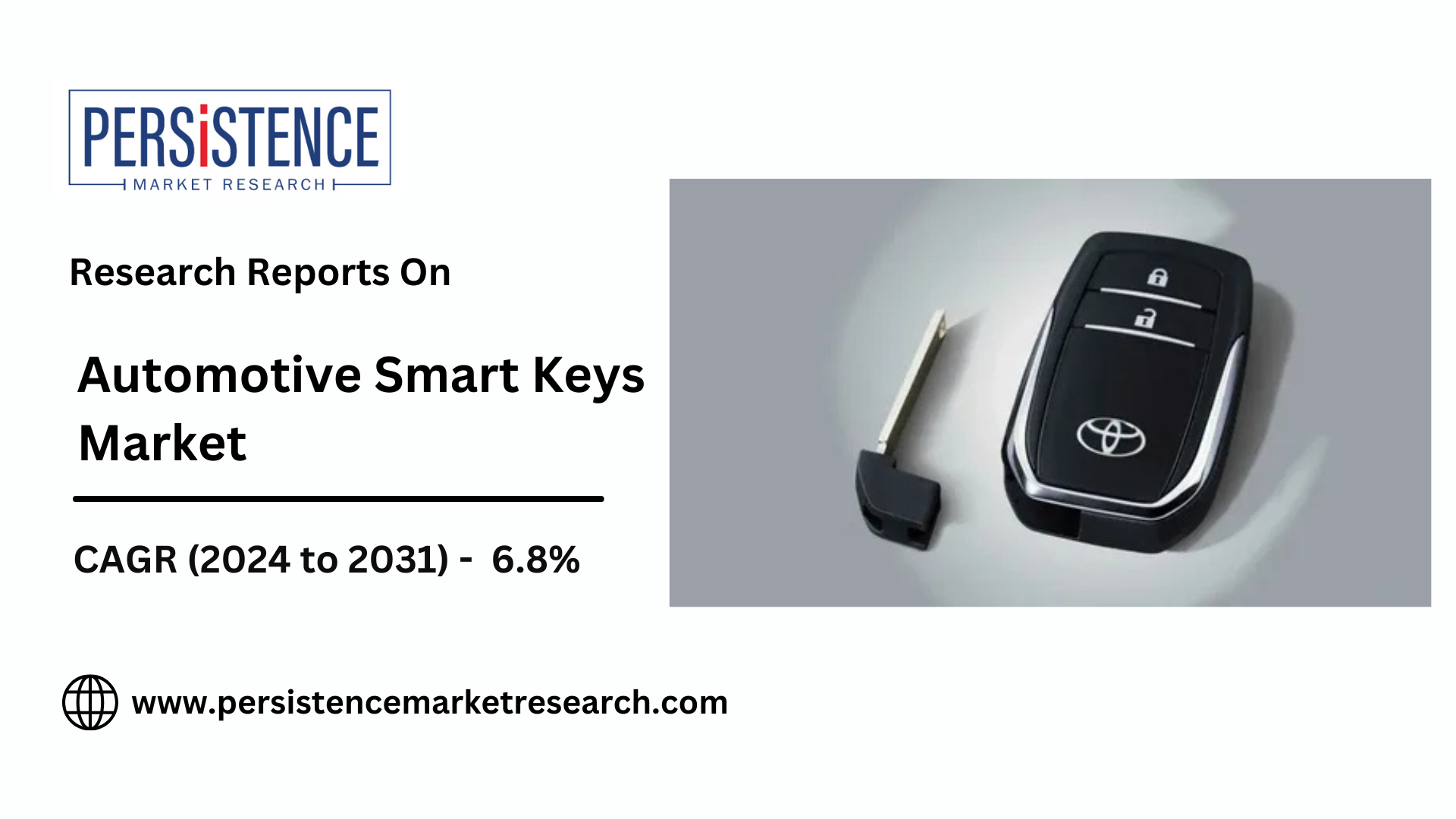Automotive Smart Keys Market Growth Fueled by IoT and Biometric Tech

The global automotive smart keys market is projected to grow at a CAGR of 6.8%, reaching US$ 21 billion by 2031 from US$ 13.2 billion in 2024. This growth is driven by the increasing demand for advanced security and convenience features, particularly in electric and luxury vehicles. Passive Keyless Entry (PKE) and multi-functional smart keys are gaining popularity, offering touchless access, remote start, and personalized settings. Europe and South Asia are key regions experiencing robust growth, with notable adoption in luxury vehicles and emerging markets. As technology advances, smart key systems are becoming integral to modern vehicle design, enhancing both security and user experience.
The automotive industry is rapidly evolving, with keyless entry systems becoming a fundamental feature in modern vehicles. Automotive smart keys, powered by cutting-edge technologies such as the Internet of Things (IoT) and biometric systems, are leading the charge in transforming the driving experience. These advanced systems not only offer greater convenience but also enhance vehicle security, ushering in a new era of personalized automotive technology. This article explores the growth of the automotive smart keys market, driven by innovations in IoT and biometric technology, and highlights the key factors propelling this market forward.
The Role of IoT in Automotive Smart Keys
The Internet of Things (IoT) has had a transformative impact on many industries, and the automotive sector is no exception. IoT allows various devices, including automotive smart keys, to communicate seamlessly, creating an interconnected experience that enhances the functionality of modern vehicles.
Automotive smart keys, which are connected to the vehicle through wireless communication protocols such as Bluetooth, NFC, or RFID, leverage IoT to provide a range of features that improve user convenience and security. For example, IoT-powered smart keys enable keyless entry, remote start, and real-time location tracking. Additionally, these systems can automatically adjust vehicle settings, such as seat position, climate control, and infotainment preferences, based on the owner's preferences.
The integration of IoT into automotive smart keys also enhances vehicle security. By enabling continuous communication between the key and the vehicle, IoT-based systems can detect unauthorized access attempts and provide real-time alerts to the vehicle owner. This level of connectivity ensures that smart keys offer not only convenience but also advanced security measures, which is a key driver of market growth.
The Influence of Biometric Technology on Automotive Smart Keys
Another technology playing a pivotal role in the automotive smart keys market is biometric technology. Biometric authentication, which uses unique physical traits such as fingerprints, facial recognition, and iris scans, is increasingly being integrated into automotive keyless entry systems. This integration takes vehicle security and personalization to the next level, making it virtually impossible for unauthorized individuals to access the vehicle.
Fingerprint Recognition
One of the most common biometric technologies used in automotive smart keys is fingerprint recognition. By scanning the driver's fingerprint, the system authenticates the individual before granting access to the vehicle. This technology is particularly appealing for high-end vehicles, where security is a priority, and drivers seek personalized experiences.
Facial Recognition and Iris Scanning
In addition to fingerprint recognition, some advanced automotive smart keys are incorporating facial recognition and iris scanning. These biometric systems use sophisticated algorithms to analyze the driver's facial features or eye patterns to grant access to the vehicle. These technologies offer a higher level of security compared to traditional keyless entry systems, as biometric traits are unique and difficult to replicate.
The inclusion of biometric authentication in automotive smart keys enhances the overall user experience by providing a more personalized and seamless interaction with the vehicle. It allows drivers to unlock and start their cars without the need for physical keys or codes, improving convenience and efficiency.
How IoT and Biometric Technologies Drive Market Growth
The convergence of IoT and biometric technologies in automotive smart keys is driving significant growth in the market. These technologies address key consumer demands for convenience, security, and personalization, making them highly attractive to both automotive manufacturers and consumers alike.
Enhanced Convenience and User Experience
One of the primary benefits of IoT-powered and biometric-enabled automotive smart keys is the improved user experience. Consumers now expect seamless interactions with their vehicles, and smart keys make this a reality. The ability to remotely access and control various functions of the vehicle through IoT connectivity enhances convenience, while biometric authentication eliminates the need for traditional keys, making the process faster and more intuitive.Improved Vehicle Security
Security remains a top concern for vehicle owners, especially as car theft and unauthorized access become more sophisticated. IoT-enabled automotive smart keys enhance security by enabling continuous communication between the key and the vehicle, while biometric authentication adds an extra layer of protection. This dual approach significantly reduces the risk of theft and unauthorized access, which is a critical selling point for both consumers and manufacturers.Personalized Driving Experience
As the automotive industry moves toward more personalized experiences, smart keys powered by IoT and biometric technology are leading the way. These systems can store driver preferences, such as seat positions, temperature settings, and entertainment preferences, and automatically adjust them when the authorized driver enters the vehicle. This level of personalization not only improves comfort but also makes the driving experience more enjoyable.Integration with Smart Ecosystems
The IoT-enabled automotive smart keys are often integrated into broader smart ecosystems, such as connected homes and smart cities. This integration allows the vehicle to interact with other smart devices and systems, creating a seamless and interconnected experience for the driver. For example, a driver could unlock their vehicle as they approach their home, with the system communicating with smart home devices to adjust the lighting, temperature, and security settings automatically. This synergy between automotive technology and IoT-enabled ecosystems is a key factor driving market growth.
Market Growth Projections and Future Trends
The automotive smart keys market is poised for significant growth in the coming years. As IoT and biometric technologies continue to evolve and become more accessible, the adoption of smart keys in vehicles is expected to rise exponentially. The market is expected to see a compounded annual growth rate (CAGR) of over 10% over the next decade, with North America, Europe, and Asia Pacific leading the charge in market expansion.
Growing Demand for Electric Vehicles (EVs)
The increasing adoption of electric vehicles (EVs) is expected to play a key role in driving the growth of the automotive smart keys market. As more consumers opt for EVs, manufacturers are incorporating advanced technologies such as smart keys to differentiate their offerings. The integration of IoT and biometric systems in EVs will further enhance the appeal of these vehicles, making them more secure, convenient, and user-friendly.
Technological Advancements and Cost Reductions
As the cost of IoT and biometric technologies continues to decline, the adoption of smart keys is likely to expand beyond luxury vehicles to mid-range and entry-level cars. This will drive the growth of the automotive smart keys market across different segments and geographies. Furthermore, advancements in communication protocols, such as 5G, will enable faster and more reliable connectivity, improving the performance of smart key systems.
Challenges in the Automotive Smart Keys Market
While the growth prospects for the automotive smart keys market are promising, there are challenges that manufacturers and consumers must address.
Security Risks and Hacking Concerns
As automotive smart keys rely on wireless communication and connectivity, they are susceptible to hacking and unauthorized access. Manufacturers must invest in robust encryption and security measures to prevent vulnerabilities and ensure the safety of consumers.Consumer Education and Awareness
Despite the growing popularity of smart keys, there is still a need for consumer education regarding the benefits and features of these systems. Raising awareness about the security advantages, convenience, and personalization options offered by smart keys is crucial to driving wider adoption.
Conclusion
The automotive smart keys market is experiencing rapid growth, fueled by the convergence of IoT and biometric technologies. These innovations are transforming the way consumers interact with their vehicles, offering enhanced convenience, security, and personalization. As smart keys become more prevalent in both traditional and electric vehicles, the market is set to expand significantly. With advancements in technology, increased consumer demand, and a growing focus on vehicle security, the automotive smart keys market is poised for a bright future, shaping the next generation of connected vehicles.
Note: IndiBlogHub features both user-submitted and editorial content. We do not verify third-party contributions. Read our Disclaimer and Privacy Policyfor details.







